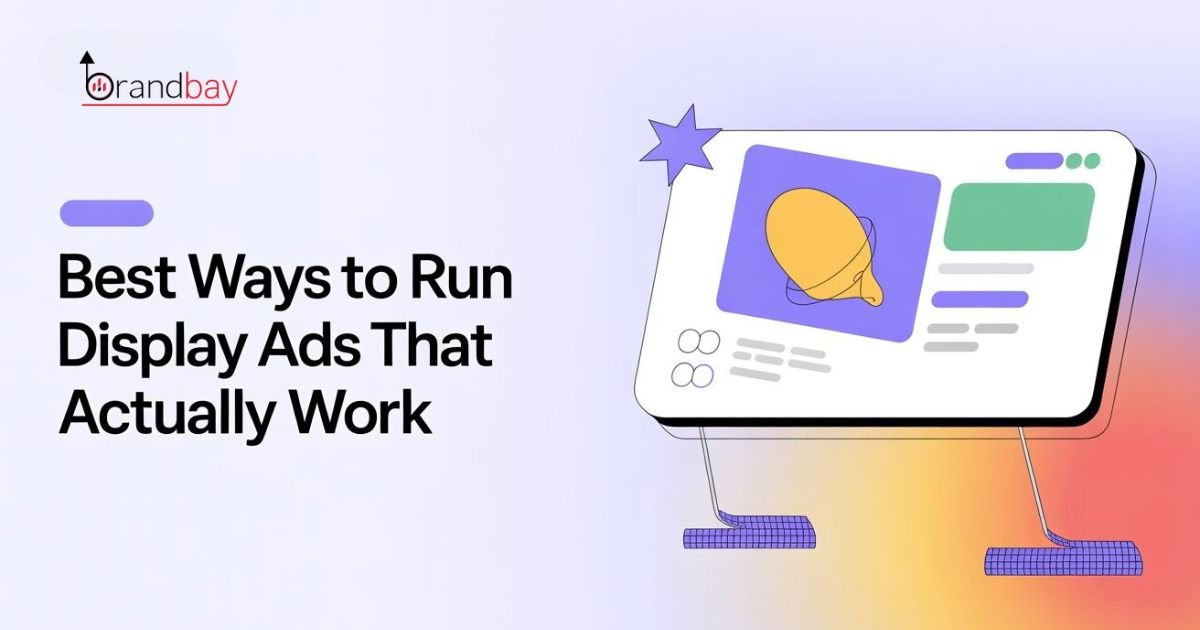Display advertising is no longer a secondary part of digital marketing, it has become a crucial engine for driving sales and high-quality traffic. If executed well, display ads can deliver exponential returns. But running ads that actually work? That’s where many marketers fall short.
In this detailed guide from BrandBay, we will show you how to run effective display ads using proven strategies that drive measurable results whether your goal is to grow brand awareness, increase website traffic, or drive conversions.
What Are Display Ads?
Display ads are visual advertisements that appear across websites, apps, and platforms like YouTube, Facebook, & Google Display Network (GDN). These include banners, pop-ups, interactive graphics, videos, and more.
Their goal? To grab user attention, promote your brand, and guide the user into your sales funnel even if they’re not actively searching for your product or service.
Display ads are ideal for reaching large audiences at scale. Unlike search ads, which rely on user intent, display advertising allows you to push your message to relevant users proactively.
Why Display Advertising Still Works in 2025
With ad fatigue and banner blindness increasing, some marketers argue that display ads are dying. But that’s far from true. Here’s why display advertising still thrives:
-
Massive Reach: Google Display Network alone reaches over 90% of global internet users.
-
Retargeting Power: You can re-engage users who visited your site but didn’t convert.
-
Visual Engagement: Visuals create lasting brand recall compared to plain text ads.
-
Cost Efficiency: CPM and CPC on display ads are often lower than other channels.
-
Support for Funnel Building: Display ads are excellent for top- and mid-funnel marketing.
Whether you're a SaaS brand, eCommerce store, or service provider, display ads still bring excellent ROI when executed with precision.
Display Advertising Strategies That Work
To run successful display ads, you need more than a good-looking banner. You need a plan. A strategy. Here's what separates amateurs from professionals:
1. Goal Definition
Every campaign must begin with clarity:
-
Are you aiming for awareness?
-
Do you want to increase sales?
-
Are you nurturing returning visitors?
Each goal requires different creatives, placements, and calls to action.
2. Audience Segmentation
Don’t spray and pray. Use segmentation to target:
-
Demographics (age, gender, income)
-
Interests (tech enthusiasts, fashion lovers, etc.)
-
Behaviors (users who abandoned cart, visited a landing page, etc.)
3. Platform Relevance
Don’t limit yourself to Google Display Network. Try:
-
Facebook Audience Network
-
LinkedIn Display Ads
-
Taboola/Outbrain for native placements
-
YouTube for video retargeting
Choose platforms where your audience lives.
4. Creative Differentiation
Avoid generic stock imagery and cliché copy.
-
Show real products or people
-
Use brand colors, logos, and emotional hooks
-
Run A/B tests between variations
5. Smart Bidding and Budgeting
Use automated bidding to get better ROI. Start small and scale once performance stabilizes.
How to Run Display Ads Like a Pro
Running ads is more than just hitting the launch button. Follow this framework:
Step 1: Create or Refine Your Offer
If your product or CTA isn’t compelling, no ad will work. Define your unique value proposition.
Step 2: Build Your Landing Page
Ensure it matches the ad in tone, message, and design. Add testimonials, social proof, and a strong CTA.
Step 3: Design the Ad Creatives
Use tools like Canva, Figma, or Adobe Express to build your creatives. Make sure:
-
Fonts are legible
-
CTAs are above the fold
-
Contrast draws attention to the button
Step 4: Set Up Targeting
Use keyword targeting, topic targeting, placement targeting, and affinity audiences.
Step 5: Launch With Caution
Start with a test budget. Let the campaign run for at least 7 days before judging performance.
Anatomy of Effective Display Ads
Effective display ads are persuasive, clean, and action-driven. Here are must-have components:
-
Headline – Short and attention-grabbing
-
Visual – Relevant image or animation
-
Body Text – Highlight the benefit, not just the feature
-
Call to Action – “Buy Now,” “Claim Your Offer,” etc.
-
Branding – Logo and brand colors for credibility
Also:
-
Keep text under 20% of the banner
-
Compress file size under 150KB
-
Use HTML5 or GIFs to add animation without slowing things down
The Power of Retargeting With Display Ads
Over 97% of users won’t convert on their first visit. Retargeting display ads bring them back. Here’s how to leverage it:
-
Retarget based on URLs visited
-
Create separate ads for product viewers vs cart abandoners
-
Show urgency-based messages like “Only 3 items left!”
Tools to set up retargeting:
-
Google Ads Audience Manager
-
Facebook Pixel
-
Segment or GA4 for tracking user journeys
Tools That Help You Run High-Performance Display Campaigns
-
Google Ads Editor – For bulk campaign editing
-
Canva Pro – Easy ad creative generation
-
Hotjar – Understand landing page behavior
-
Semrush / SpyFu – Monitor competitor display ads
-
Optmyzr – For ad automation and optimization
Budgeting for Cost-Effective Display Ads
You don’t need massive ad budgets to win. Here's how to make every dollar count:
-
Start with a test budget of ₹5,000–₹10,000
-
Focus on low-CPC placements
-
Use geo-targeting and dayparting
-
Bid smart with enhanced CPC or target CPA
Final Thoughts: Why Display Advertising Still Rules
Display ads are not just for big brands with million-dollar budgets. Small businesses, agencies, and entrepreneurs can generate incredible ROI if they:
-
Follow a proven strategy
-
Focus on effective creatives
-
Leverage targeting smartly
-
Optimize continuously
At BrandBay, we help brands build scalable, performance-driven display campaigns that convert. Whether you're new or seasoned, our team can help you run display ads that actually work.
Need Help With Your Display Strategy?
Talk to a BrandBay expert today and request a free audit of your current display campaigns.


